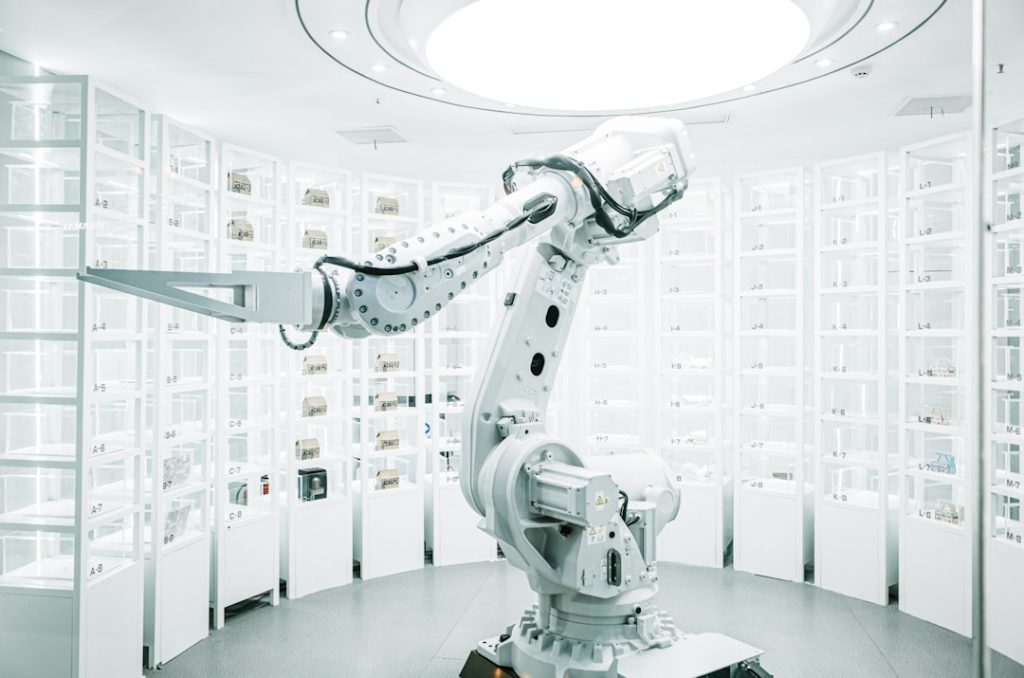Hypernatural AI represents a significant leap in the field of artificial intelligence, characterized by its ability to not only mimic human-like cognitive functions but also to enhance and augment human capabilities in unprecedented ways. This advanced form of AI integrates deep learning, natural language processing, and machine learning to create systems that can understand, learn, and adapt in real-time. Unlike traditional AI, which often operates within predefined parameters, Hypernatural AI possesses a level of flexibility and responsiveness that allows it to engage with complex environments and tasks.
This transformative technology is poised to redefine the boundaries of human-machine interaction, offering solutions that are more intuitive and aligned with human needs. As we delve deeper into the implications of Hypernatural AI, it becomes evident that its potential extends far beyond mere automation. It promises to revolutionize industries by providing insights and capabilities that were previously unimaginable.
From healthcare to finance, education to entertainment, Hypernatural AI is set to enhance decision-making processes, improve efficiency, and foster innovation. However, with such profound advancements come significant responsibilities and challenges that society must address. Understanding the nuances of Hypernatural AI is crucial as we navigate this new frontier, ensuring that its development aligns with ethical standards and societal values.
Key Takeaways
- Hypernatural AI refers to artificial intelligence that is indistinguishable from human intelligence and behavior, blurring the lines between natural and artificial intelligence.
- Artificial intelligence has evolved from rule-based systems to machine learning and deep learning, leading to the development of hypernatural AI.
- Hypernatural AI has the potential to revolutionize various industries such as healthcare, finance, and transportation, by improving efficiency and decision-making processes.
- Ethical considerations and challenges of hypernatural AI include issues related to privacy, bias, and the potential for job displacement.
- The impact of hypernatural AI on society and the workforce will require careful consideration and proactive measures to ensure a smooth transition and minimize negative effects.
The Evolution of Artificial Intelligence
The Early Years of AI Research
Beginning in the mid-20th century, early AI research focused on symbolic reasoning and problem-solving, laying the groundwork for future developments.
The Advent of Machine Learning
The advent of machine learning in the 1980s introduced algorithms that allowed computers to learn from data rather than relying solely on programmed instructions. This shift marked a pivotal moment in AI’s evolution, enabling systems to improve their performance over time through experience. As computational power increased and data became more abundant, the field witnessed a surge in interest and investment, leading to breakthroughs in neural networks and deep learning.
The Emergence of Hypernatural AI
In recent years, the emergence of Hypernatural AI has signified a new chapter in this ongoing evolution. This advanced form of AI builds upon the foundations laid by its predecessors while incorporating sophisticated techniques that allow for greater adaptability and contextual understanding. Hypernatural AI systems can analyze vast amounts of unstructured data, recognize patterns, and generate insights that were previously unattainable.
Implications for the Future
This evolution reflects a broader trend towards creating machines that not only perform tasks but also understand the nuances of human behavior and decision-making processes. As we continue to explore the capabilities of Hypernatural AI, it is essential to recognize the historical context that has led us to this point and the implications it holds for the future.
The Potential of Hypernatural AI in Various Industries

The potential applications of Hypernatural AI span a wide array of industries, each poised to benefit from its unique capabilities. In healthcare, for instance, Hypernatural AI can analyze patient data with remarkable precision, enabling personalized treatment plans and early detection of diseases. By integrating vast datasets from medical records, genetic information, and real-time health monitoring devices, these systems can provide healthcare professionals with actionable insights that enhance patient outcomes.
Furthermore, Hypernatural AI can assist in drug discovery by simulating molecular interactions and predicting the efficacy of new compounds, significantly accelerating the research process. In the realm of finance, Hypernatural AI is transforming how institutions manage risk and make investment decisions. By leveraging advanced algorithms that analyze market trends and consumer behavior, financial firms can develop predictive models that enhance their strategic planning.
Additionally, Hypernatural AI can streamline operations by automating routine tasks such as fraud detection and compliance monitoring, allowing human analysts to focus on more complex issues. The retail sector is also experiencing a revolution as Hypernatural AI enables personalized shopping experiences through recommendation systems that understand individual preferences and behaviors. As these examples illustrate, the potential of Hypernatural AI is vast and varied, promising to drive innovation across multiple sectors.
Ethical Considerations and Challenges of Hypernatural AI
| Ethical Considerations and Challenges of Hypernatural AI |
|---|
| Privacy concerns |
| Security risks |
| Biases in AI algorithms |
| Impact on employment |
| Legal and regulatory issues |
As we embrace the advancements brought forth by Hypernatural AI, it is imperative to address the ethical considerations and challenges that accompany its integration into society. One of the primary concerns revolves around data privacy and security. Hypernatural AI systems rely on vast amounts of personal data to function effectively; thus, ensuring that this information is collected, stored, and utilized responsibly is crucial.
The potential for misuse or unauthorized access to sensitive data raises significant ethical questions about consent and accountability. Establishing robust frameworks for data governance will be essential in mitigating these risks while fostering public trust in these technologies. Another pressing ethical challenge lies in the potential for bias within Hypernatural AI systems.
If these systems are trained on datasets that reflect existing societal biases or inequalities, they may inadvertently perpetuate or exacerbate these issues in their decision-making processes. This concern is particularly relevant in areas such as hiring practices, law enforcement, and lending decisions, where biased algorithms can lead to unfair treatment of individuals based on race, gender, or socioeconomic status. To combat this challenge, it is vital for developers and organizations to prioritize fairness and transparency in their AI models.
Implementing rigorous testing protocols and diverse training datasets can help ensure that Hypernatural AI systems operate equitably and justly.
The Impact of Hypernatural AI on Society and Workforce
The introduction of Hypernatural AI into various sectors is poised to have profound implications for society and the workforce at large. On one hand, this technology has the potential to enhance productivity and efficiency across industries, leading to economic growth and improved quality of life. By automating routine tasks and providing intelligent insights, Hypernatural AI can free up human workers to focus on more creative and strategic endeavors.
This shift could lead to the emergence of new job roles that require advanced skills in collaboration with AI technologies, fostering a workforce that is more adaptable and innovative. However, the rise of Hypernatural AI also raises concerns about job displacement and economic inequality. As machines become capable of performing tasks traditionally carried out by humans, there is a legitimate fear that many workers may find themselves obsolete in an increasingly automated landscape.
This transition could exacerbate existing disparities in employment opportunities, particularly for those in low-skilled positions who may struggle to adapt to new technological demands. To address these challenges, it is essential for policymakers and educational institutions to invest in reskilling programs that equip workers with the necessary skills to thrive in an AI-driven economy. By fostering a culture of lifelong learning and adaptability, society can harness the benefits of Hypernatural AI while mitigating its potential drawbacks.
The Role of Hypernatural AI in Advancing Scientific Research

Revolutionizing Scientific Research with Hypernatural AI
Hypernatural AI holds immense promise for advancing scientific research across various disciplines by enabling researchers to analyze complex datasets with unprecedented speed and accuracy. In fields such as genomics and climate science, where vast amounts of data are generated daily, traditional analytical methods often fall short in extracting meaningful insights. Hypernatural AI can process this information efficiently, identifying patterns and correlations that may not be immediately apparent to human researchers.
Accelerating Discovery and Enhancing Understanding
This capability not only accelerates the pace of discovery but also enhances our understanding of intricate systems, paving the way for groundbreaking innovations. Moreover, Hypernatural AI can facilitate collaboration among researchers by providing platforms for knowledge sharing and interdisciplinary communication. By integrating diverse datasets from different fields, these systems can generate holistic insights that drive innovation at the intersection of disciplines.
Unlocking Interdisciplinary Breakthroughs
For instance, combining data from biology, chemistry, and environmental science could lead to novel approaches in drug development or sustainable practices. By integrating diverse datasets, researchers can uncover new relationships and patterns that may have gone unnoticed through traditional methods. This interdisciplinary approach can lead to innovative solutions that transform various fields of study.
A New Era in Scientific Inquiry
As researchers increasingly leverage Hypernatural AI tools in their work, we can expect a paradigm shift in how scientific inquiries are conducted—one that emphasizes collaboration, efficiency, and a deeper understanding of complex phenomena. This shift has the potential to revolutionize the way we approach scientific research, leading to new discoveries and breakthroughs that transform our understanding of the world.
The Future of Hypernatural AI: Opportunities and Risks
Looking ahead, the future of Hypernatural AI presents a landscape filled with both opportunities and risks that society must navigate carefully. On one hand, the continued advancement of this technology promises to unlock new frontiers in innovation across various sectors. From enhancing healthcare outcomes through personalized medicine to revolutionizing transportation with autonomous vehicles, the possibilities are vast.
Furthermore, as Hypernatural AI systems become more sophisticated in understanding human emotions and social dynamics, they may play a pivotal role in improving mental health support services or enhancing customer experiences across industries. Conversely, the rapid proliferation of Hypernatural AI also raises significant concerns regarding accountability and control. As these systems become more autonomous in their decision-making processes, questions arise about who is responsible for their actions—especially in scenarios where errors or biases occur.
Additionally, the potential for misuse or malicious applications of Hypernatural AI poses risks that cannot be overlooked. Ensuring robust regulatory frameworks are established will be crucial in addressing these challenges while fostering an environment conducive to innovation. Striking a balance between harnessing the benefits of Hypernatural AI while safeguarding against its risks will require collaboration among technologists, policymakers, ethicists, and society at large.
Embracing the Potential of Hypernatural AI
In conclusion, Hypernatural AI represents a transformative force poised to reshape our world in profound ways. Its ability to enhance human capabilities while driving innovation across various sectors underscores its potential as a catalyst for positive change. However, as we embrace this technology’s possibilities, it is essential to remain vigilant about the ethical considerations and challenges it presents.
By prioritizing responsible development practices and fostering an inclusive dialogue around its implications, we can ensure that Hypernatural AI serves as a tool for empowerment rather than division. As we stand on the brink of this new era in artificial intelligence, it is imperative for all stakeholders—governments, businesses, researchers, and individuals—to collaborate in shaping a future where Hypernatural AI enhances our lives while upholding our shared values. By embracing this potential with foresight and responsibility, we can navigate the complexities ahead while unlocking new opportunities for growth and progress in an increasingly interconnected world.
The journey toward realizing the full promise of Hypernatural AI has just begun; how we approach it will determine its impact on society for generations to come.



